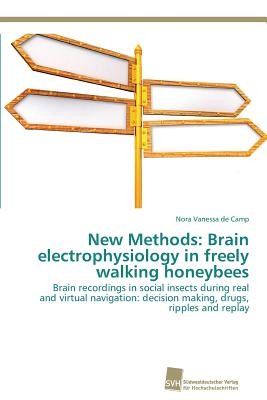
- We will send in 10–14 business days.
- Author: Nora Vanessa de Camp
- Publisher: Sudwestdeutscher Verlag Fur Hochschulschriften AG
- Year: 2013
- Pages: 248
- ISBN-10: 3838136608
- ISBN-13: 9783838136608
- Format: 15.2 x 22.9 x 1.4 cm, minkšti viršeliai
- Language: English
- SAVE -10% with code: EXTRA
Reviews
Description
Insects are presently the most successfull taxon with respect to the number of individuals and species. They are economically as well as ecologically important, as for example honeybees. Insects developed a huge variety of locomotor strategies, the most important ones are walking and flight. Due to their small size, electrophysiology has mostly been done in restrained insects. The development of chronically implantable micro plugs for long-term extracellular brain recordings in eusocial insects, like honeybees and hornets led to astonishing results: place related spiking activity during real and virtual navigation as well as associated local field potentials and probably replay of these patterns during sleep phases. Are map like spatial coding strategies, as they are documented for the rodent hippocampus, also realized in comparatively small insect brains, with approximately 1.000.000 Neurons?
EXTRA 10 % discount with code: EXTRA
The promotion ends in 22d.00:41:08
The discount code is valid when purchasing from 10 €. Discounts do not stack.
- Author: Nora Vanessa de Camp
- Publisher: Sudwestdeutscher Verlag Fur Hochschulschriften AG
- Year: 2013
- Pages: 248
- ISBN-10: 3838136608
- ISBN-13: 9783838136608
- Format: 15.2 x 22.9 x 1.4 cm, minkšti viršeliai
- Language: English English
Insects are presently the most successfull taxon with respect to the number of individuals and species. They are economically as well as ecologically important, as for example honeybees. Insects developed a huge variety of locomotor strategies, the most important ones are walking and flight. Due to their small size, electrophysiology has mostly been done in restrained insects. The development of chronically implantable micro plugs for long-term extracellular brain recordings in eusocial insects, like honeybees and hornets led to astonishing results: place related spiking activity during real and virtual navigation as well as associated local field potentials and probably replay of these patterns during sleep phases. Are map like spatial coding strategies, as they are documented for the rodent hippocampus, also realized in comparatively small insect brains, with approximately 1.000.000 Neurons?


Reviews